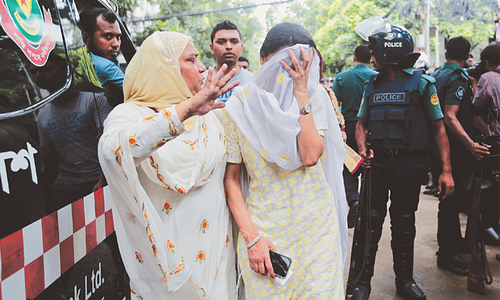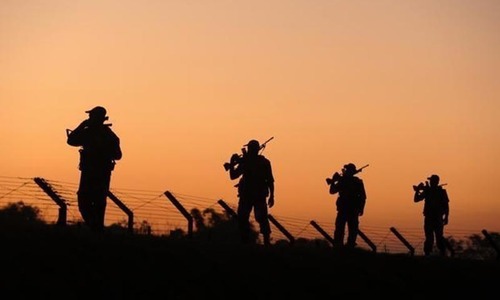ISLAMABAD: Adviser to Prime Minister on Foreign Affairs Sartaj Aziz on Friday called upon the international community to unite in order to jointly combat terrorism.
Talking to media regarding the the upcoming Nato summit, Aziz maintained that the summit is taking place under the the long shadows of terrorism, turmoil and continuing conflicts.
"We have seen major terrorist attacks in Afghanistan, Bangladesh, Iraq, Saudi Arabia and Turkey. Terrorism could only be defeated with unity and cooperation of the international community," the adviser remarked.
Answering a question, Aziz maintained that operation Zarb-i-Azb in North Waziristan has benefited people of Pakistan and that Afghanistan should also capitalise on the successes achieved by Pakistan Army in its anti-terror efforts.
"We expect that as we intensify our efforts to facilitate the peace process in Afghanistan, they [Afghans] will also capitalise on the dividends of these counter-terrorism operations to facilitate this process," Aziz added.
Related: Pakistan cannot fight Afghanistan’s war on its own soil: Aziz
Key points of Nato's Warsaw summit
Nato leaders are meeting for a two day summit in Warsaw on Friday [today] to finalise the biggest alliance revamp since the collapse of the Soviet Union to counter what they see as an aggressive and dangerously unpredictable Russia.
The US-led alliance is putting in place a “Readiness Action Plan” to ensure it is not caught napping the way critics say it was by the conflict in eastern Ukraine and Russia's 2014 annexation of Crimea. Here are key issues to be discussed:
Spending power
Nato leaders took a first, crucial step at their 2014 summit in Wales when they agreed to reverse years of spending cuts and committed to allocate two per cent of annual economic output to defence.
Progress since then has been patchy, with only five of the 28 member states meeting the target at a time of austerity.
Nato chief Jens Stoltenberg says the alliance has now halted the cuts, increasing combined spending last year by 0.6 per cent for Canada and the European allies, with a gain of 3.0 per cent expected in 2016.
In Warsaw, member states will be given a report card to show just where each stands — and what more they must do to come up to scratch.
Baltic tripwire
Nato was shocked by the speed and effectiveness of Russia's Ukraine intervention, especially its former Soviet-bloc members who fear they could be left in the lurch in any repeat.
To meet those concerns, Nato leaders will approve sending four battalions — one each to Estonia, Latvia, Lithuania and Poland — to act as a tripwire against any Russian adventurism.
Each battalion will number 600-800 troops, perhaps slightly more, with the deployment to send a signal of Nato resolve to all concerned.
Spearhead Force
The forward battalions are backed up by a “Spearhead Force” — officially the “Very High Readiness Joint Task Force” -- which numbers about 5,000 troops ready to move within a couple of days.
NATO has established forward command centres along its eastern flank so that these Spearhead troops can hit the ground running, picking up pre-positioned heavy equipment to cut deployment times in a crisis.
The alliance has also tripled the size of the Nato Response Force to some 40,000 troops which would follow the Spearhead unit — but many are concerned their deployment would take weeks if not months.
Readiness exercises
NATO has mounted a series of exercises, especially in the eastern member states, to test readiness levels and reassure nervous allies.
It has also deployed extra aircraft to boost air policing, especially over the Baltics where they frequently encounter Russia planes in a dangerous game of cat and mouse.
More ships also help keep a closer eye on Moscow.
Cyberdefence
The Ukraine crisis highlighted the danger posed by “hybrid warfare,” a combination of conventional weaponry and information technology to destabilise an opponent without a formal declaration of hostilities.
Nato leaders agreed in Wales that a cyber attack against a member state could be considered the equivalent of a military attack, triggering its “one for all, all for one” Article 5 collective defence response.
Now they are going further, formally designating cyber defence as a Nato operational area which will require resources and planning.
Eyes south
The Nato upgrade revamp has largely been driven by the Ukraine crisis but alliance leaders are increasingly worried by war and upheaval in the Middle East and across North Africa.
Deadly terrorist attacks, most recently in Paris and Brussels claimed by Islamic State militants, have brought the message home that instability to the south is also a threat.
Accordingly, Nato aims to “project stability” by providing advice and assistance in the region to head off future problems while boosting cooperation with the European Union.












































